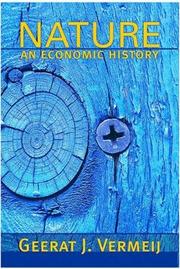| Listing 1 - 10 of 15 | << page >> |
Sort by
|

ISBN: 0691115273 069112793X 1400826497 1282129562 9786612129568 9781400826490 9780691127934 9780691115276 9780691127934 6612129565 9781282129566 Year: 2004 Publisher: Princeton, NJ: Princeton university press,
Abstract | Keywords | Export | Availability | Bookmark
 Loading...
Loading...Choose an application
- Reference Manager
- EndNote
- RefWorks (Direct export to RefWorks)
From humans to hermit crabs to deep water plankton, all living things compete for locally limiting resources. This universal truth unites three bodies of thought--economics, evolution, and history--that have developed largely in mutual isolation. Here, Geerat Vermeij undertakes a groundbreaking and provocative exploration of the facts and theories of biology, economics, and geology to show how processes common to all economic systems--competition, cooperation, adaptation, and feedback--govern evolution as surely as they do the human economy, and how historical patterns in both human and nonhuman evolution follow from this principle. Using a wealth of examples of evolutionary innovations, Vermeij argues that evolution and economics are one. Powerful consumers and producers exercise disproportionate controls on the characteristics, activities, and distribution of all life forms. Competition-driven demand by consumers, when coupled with supply-side conditions permitting economic growth, leads to adaptation and escalation among organisms. Although disruptions in production halt or reverse these processes temporarily, they amplify escalation in the long run to produce trends in all economic systems toward greater power, higher production rates, and a wider reach for economic systems and their strongest members. Despite our unprecedented power to shape our surroundings, we humans are subject to all the economic principles and historical trends that emerged at life's origin more than 3 billion years ago. Engagingly written, brilliantly argued, and sweeping in scope, Nature: An Economic History shows that the human institutions most likely to preserve opportunity and adaptability are, after all, built like successful living things.
History of civilization --- Natural history --- Economic aspects --- Competitive Behavior. --- Economic Competition. --- Evolution. --- Economic aspects. --- 330 --- 338 <09> --- AA / International- internationaal --- 331.100 --- Theoretische economie. Economische theorie. Economische analyse --- Economische geschiedenis --- Economische geschiedenis: algemeenheden. --- 338 <09> Economische geschiedenis --- 330 Theoretische economie. Economische theorie. Economische analyse --- Science --- Natural science --- Science of science --- Sciences --- History, Natural --- Physiophilosophy --- Competition, Economic --- Competitions, Economic --- Economic Competitions --- Commerce --- Behavior, Competitive --- Behaviors, Competitive --- Competitive Behaviors --- Biology --- Economische geschiedenis: algemeenheden --- Competitive behavior --- Competitiveness (Psychology) --- Conflict (Psychology) --- Interpersonal relations --- Motivation (Psychology) --- Philosophy --- Creation --- Emergence (Philosophy) --- Teleology --- Competition --- Competition (Economics) --- Competitiveness (Economics) --- Economic competition --- Conglomerate corporations --- Covenants not to compete --- Industrial concentration --- Monopolies --- Open price system --- Supply and demand --- Trusts, Industrial --- Natural sciences --- Natural history - Economic aspects

ISBN: 069108596X Year: 1993 Publisher: Princeton, N. J. Princeton University Press
Abstract | Keywords | Export | Availability | Bookmark
 Loading...
Loading...Choose an application
- Reference Manager
- EndNote
- RefWorks (Direct export to RefWorks)
Conchology --- Coquillages --- Schelpen --- Seashell collecting --- Shell collecting --- Shells --- Shells. --- Sea shells --- Seashells --- Body covering (Anatomy) --- Mollusks --- Conchologists

ISBN: 0674073754 Year: 1978 Publisher: Cambridge (Mass.) : Harvard university press,
Abstract | Keywords | Export | Availability | Bookmark
 Loading...
Loading...Choose an application
- Reference Manager
- EndNote
- RefWorks (Direct export to RefWorks)
Adaptation (Biology) --- Biogeography. --- Marine biology. --- Adaptation (Biology). --- Biogeography --- Marine biology --- Biological oceanography --- Ocean biology --- Oceanic biology --- Sea biology --- Areography (Biology) --- Geographical distribution of animals and plants --- Species --- Species distribution --- Environment --- Geographical distribution --- Aquatic biology --- Marine sciences --- Biology --- Geography --- Self-organizing systems --- Variation (Biology) --- Biological fitness --- Genetics --- Environmental adaptation --- Adaptation, Environmental
Book
ISBN: 9789046808931 Year: 2011 Publisher: [Amsterdam] : Nieuw Amsterdam,
Abstract | Keywords | Export | Availability | Bookmark
 Loading...
Loading...Choose an application
- Reference Manager
- EndNote
- RefWorks (Direct export to RefWorks)
This book shows how evolution is a concept that organizes, explains, and predicts a multitude of unconnected facts and phenomena. Adaptation plays a role not only in the development of new species but in the development of human civilization. The author presents a new argument for evolution's broader importance.
Adaptation (Biology). --- Adaptation (Biology) --- Evolution (Biology). --- Social Darwinism. --- Philosophy.
Book
ISBN: 0691084467 Year: 1987 Publisher: Princeton (N.J.) : Princeton university press,
Abstract | Keywords | Export | Availability | Bookmark
 Loading...
Loading...Choose an application
- Reference Manager
- EndNote
- RefWorks (Direct export to RefWorks)
Evolution --- Evolutie. --- Ecology. --- Evolution (Biology).
Book
ISBN: 9780691250397 Year: 2023 Publisher: Princeton, N.J. Princeton University Press
Abstract | Keywords | Export | Availability | Bookmark
 Loading...
Loading...Choose an application
- Reference Manager
- EndNote
- RefWorks (Direct export to RefWorks)
Book
ISBN: 9780691224244 Year: 2021 Publisher: Princeton, NJ
Abstract | Keywords | Export | Availability | Bookmark
 Loading...
Loading...Choose an application
- Reference Manager
- EndNote
- RefWorks (Direct export to RefWorks)
Book
ISBN: 9780691230016 Year: 2021 Publisher: Princeton, NJ
Abstract | Keywords | Export | Availability | Bookmark
 Loading...
Loading...Choose an application
- Reference Manager
- EndNote
- RefWorks (Direct export to RefWorks)
Book
ISBN: 0674073762 9780674073760 Year: 1978 Publisher: Cambridge, Mass. Harvard University Press
Abstract | Keywords | Export | Availability | Bookmark
 Loading...
Loading...Choose an application
- Reference Manager
- EndNote
- RefWorks (Direct export to RefWorks)
Biogeography --- Adaptation (Biology) --- Marine biology --- Adaptation, Biological --- Marine Biology
Digital
ISBN: 9780691224244 Year: 2021 Publisher: Princeton, N.J. Princeton University Press
Abstract | Keywords | Export | Availability | Bookmark
 Loading...
Loading...Choose an application
- Reference Manager
- EndNote
- RefWorks (Direct export to RefWorks)
| Listing 1 - 10 of 15 | << page >> |
Sort by
|

 Search
Search Feedback
Feedback About UniCat
About UniCat  Help
Help News
News